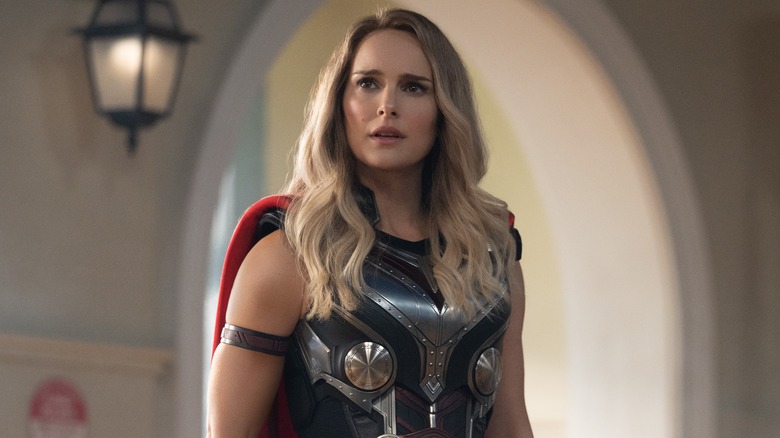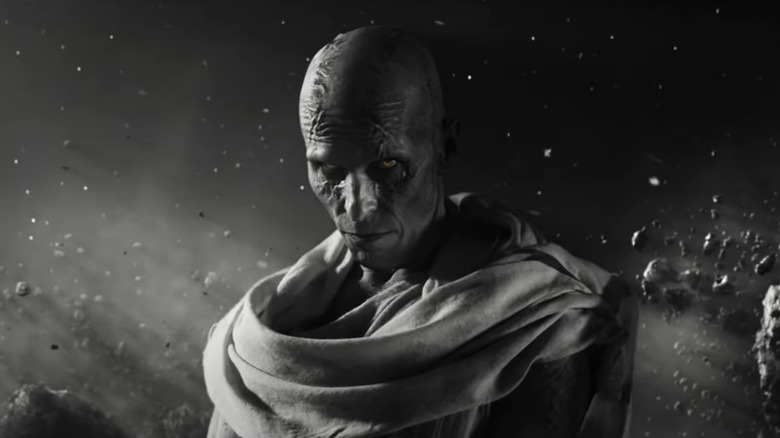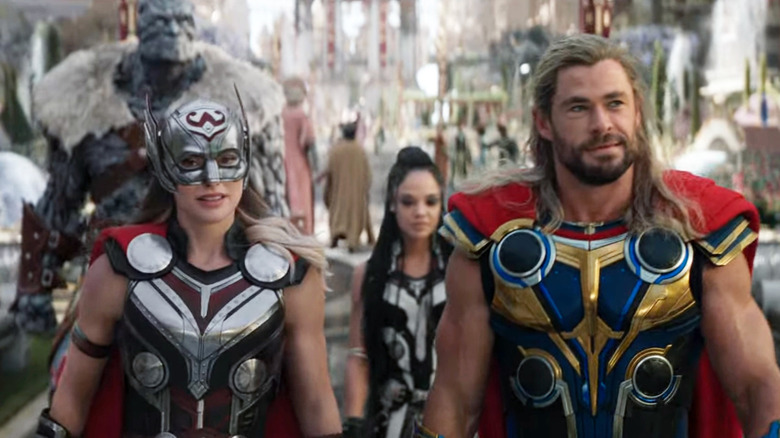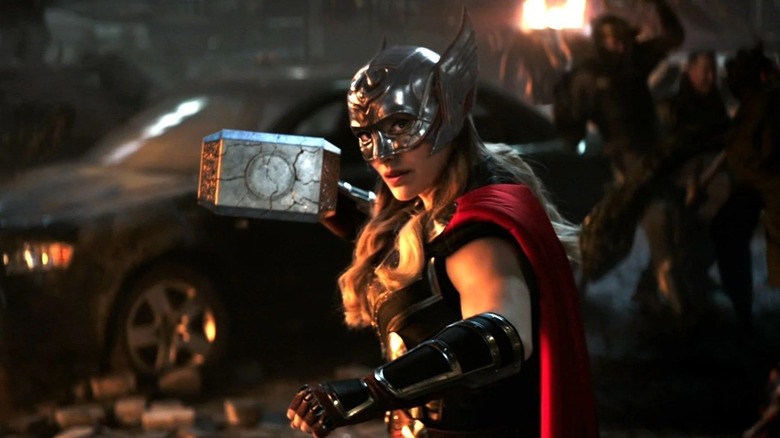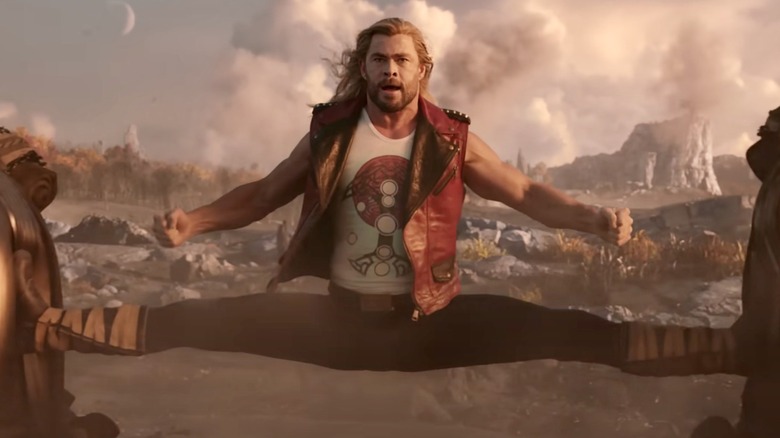Thor: Love And Thunder Spoiler Review: A Disappointing Ragnarok Follow-Up
"Thor: Love and Thunder" tries to recapture lightning in a bottle by taking a few pages out of one of the best and most celebrated comic book runs of all time, adding a terrifying and menacing villain, a new badass hero, and a story infuses tragedy with Taika Waititi's brand of whimsical and electric sense of humor. Sadly, the mix doesn't always work, with the film being unevenly paced and rushed at times. Fans of the original comic may be disappointed by the many changes the film makes, but fans of Waititi should find plenty to enjoy in this thunderous fun ride.
The film opens by introducing the villain, Gorr the God Butcher. Christian Bale's return to superhero films is nothing short of spectacular. A vastly different performance from his Batman, and a much different villain than we've seen recently in the MCU. He is relatable like Killmonger, and it is quite easy to sympathize with Gorr's quest to kill the gods who have abandoned their worshippers, but he is also scarier than even the jump-scare-friendly Scarlet Witch in Sam Raimi's own MCU movie.
Comic book purists may scoff at the character redesign, but Bale makes it his own, portraying the villain like he was Nosferatu, and a pure agent of vengeance. Waititi and cinematographer Barry Idoine use lighting and makeup effects to make Gorr a truly menacing and scary villain, even if the film doesn't actually show him doing much. Though we are told that Gorr is butchering a lot of gods, we sadly see very little of him actually doing any butchering or fighting.
A terrifying villain
As for Gorr's quest, it's hard not to root for him, especially given how the MCU is a place where gods are not some far away, abstract concepts, but just superhumans with long lives and a lot of strength — and they are both vulnerable, and undeserving. "Moon Knight" spent six episodes showing us how the whole Ennead pantheon sucked, and how easy it is to fool them. Likewise, Thor is a deity, sure, but he's not even the strongest Avenger. By showing us these gods are not much different than superheroes, "Thor: Love and Thunder" can both plant the seeds of a much larger storyline down the line that could properly question whether superheroes are even a good thing, while also showing how big of a threat Gorr is.
When Thor pays a visit to Omnipotence City and sees dozens of gods, from known Earth mythology to adorable gods like Bao god of dumplings, he quickly realizes that maybe this Gorr has some good points. Especially when his plan to ask Zeus for help backfires the moment we see Russell Crowe's Zeus. Crowe is the MVP of the film, probably the most faithful representation of the Greek god, with his big belly, love of crowds and of showing off, and a complete disregard for human life — or any life, really.
Zeus's short time in the film is mostly spent doing tricks with his thunderbolt and talking about the upcoming god orgy and whether or not Thor is invited. Though the film moves to the next thing too fast for it to matter much here, you can almost see the seeds planted for that famous Nick Fury/Thor moment from the comic in this sequence, and it is one of the most poignant moments we've seen in an MCU Thor movie.
A rushed story
Will the MCU actually follow through with this "Marvel's Original Sin" idea? Probably not, and therein lies the biggest problem with the film — any time it wants to introduce a big or profound idea it quickly rushes past it to get to the next big thing. "Thor: Love and Thunder" tries to tackle too many ideas, while still being limited to a rather short runtime.
Where "Ragnarok" was a self-contained bit of whimsy, a mostly upbeat movie that managed to sneak in a bit of anti-imperialist and anti-colonialist commentary, "Love and Thunder" not only has to condense 15 years' worth of a comic book run, but also follow the open threads from "Endgame." Indeed, this film had to reckon with its protagonist feeling depressed and having an identity crisis, in addition to delivering the promised Asgardians of the Galaxy crossover, and also tell the story of Gorr the God Butcher and how he deeply impacts Thor, and also the story of The Mighty Thor and her fight against cancer — while also delivering a fun Taika Waititi movie.
The result, inevitably, is not effective. As fun as the film still is, it ranks in the lower half of Waititi's filmography. And that's a real shame because we know Waititi can deliver tragedy and comedy without sacrificing one of them. "Hunt for the Wilderpeople" is hilarious, but also a film with some darkness to it, and "Jojo Rabbit" expertly balanced tragedy and comedy in a short runtime. But every time "Love and Thunder" reaches a poignant moment of reflection, like Thor realizing he's idolized Zeus and other gods only to be disappointed by them, the film forgets about it because it has to reach the next plot beat.
A worthy new hero
That being said, Natalie Portman crushes it as Jane Foster, aka The Mighty Thor. While also a much, much shorter story than her comics counterpart, like with Gorr, Waititi and co-writer Jennifer Kaytin Robinson capture the essence of her character and her arc. It gives justice to the comic and how it expanded the idea of what it means to be worthy, to be a hero, and to be human.
After being a nothing-character for two films, Portman makes Jane as much a protagonist here as Hemsworth's Thor, selling Jane's enthusiasm about her heroic role and the pain she's hiding. Her sacrifice is one of the best Marvel has done, but seeing it happen after not one, but two fake deaths earlier in the film takes away a bit from it.
And while Thor and Jane's romance continues to be devoid of chemistry, Waititi wasn't lying when he teased that the best romance in the film was between Thor and his hammer. Here is where Waititi's humor shines brightest, with Hemsworth's Thor torn over seeing his "ex" with someone else — the ex here being Mjolnir. Best of all was seeing Stormbreaker act like a jealous partner who constantly shows up on screen to make sure Thor is still being faithful.
We knew the film would quickly get rid of fat Thor, and it is even worse in the actual film than we were led to believe, as it all happens over a 2-minute montage near the beginning. The same happens with the "Guardians of the Galaxy" collab, which ends before it can really begin. A true shame, as the idea of heroes meeting and crossing over on a smaller scale than an Avengers-level threat was the biggest potential of the MCU post "Endgame," yet this film tosses that aside as if it was a chore to be done with as fast as possible.
A rocking if uneven experience
Even if "Love and Thunder" doesn't quite match the highs of its predecessor, the third act still has some stunning visuals, from the Shadow Realm where only a few splashes of color can be seen, to the incredible design of Eternity that looks straight out of a Jack Kirby page. Likewise, the soundtrack continues to be top-notch, whether it's the Guns N' Roses songs, a surprise ABBA, or just Michael Giacchino killing it as usual with his rock-infused score.
"Thor: Love and Thunder" is a fun ride with some great quips, one of the best romances in the MCU (no, not that one), and one of its best villains. But where many Disney+ shows have felt like movies forced to be extended into TV shows, this film felt like a TV show crammed into a film runtime, with too many plots and character arcs that were not given proper attention. Fans of Taika Waititi should have plenty to like, but those who wanted a bit more out of its promising premise and characters could leave disappointed.
Loose Ends
-
Best god must go to the Kronan god sitting on a throne literally made out of scissors.
-
Korg had a rock baby with a rock guy named Dwayne who sports a "Johnson" mustache.
-
Best boy Darryl came back!
-
Once again: he's here, he's there, he's everyf***ingwhere, Roy Kent!
-
Thor sharing his power with a bunch of kids is peak Waititi and I love it.
